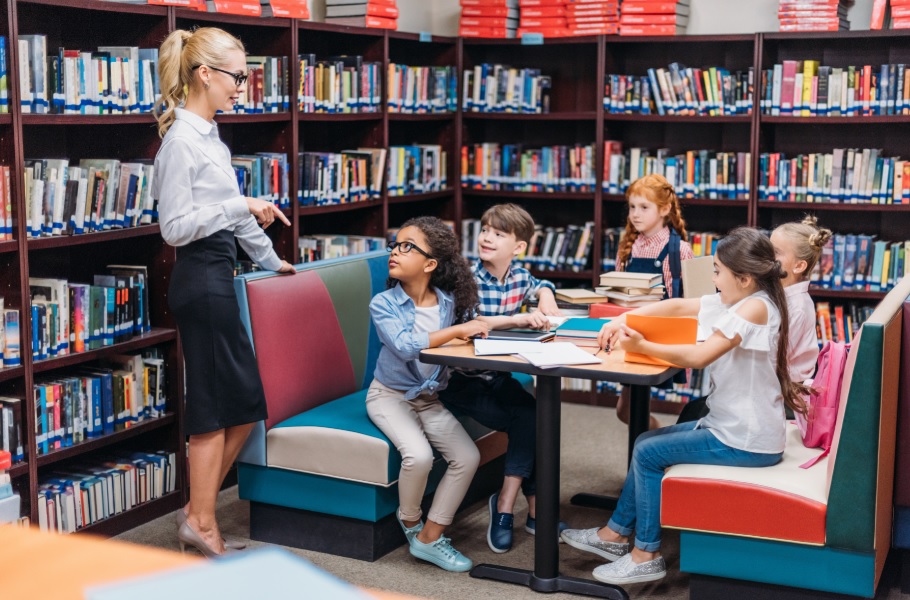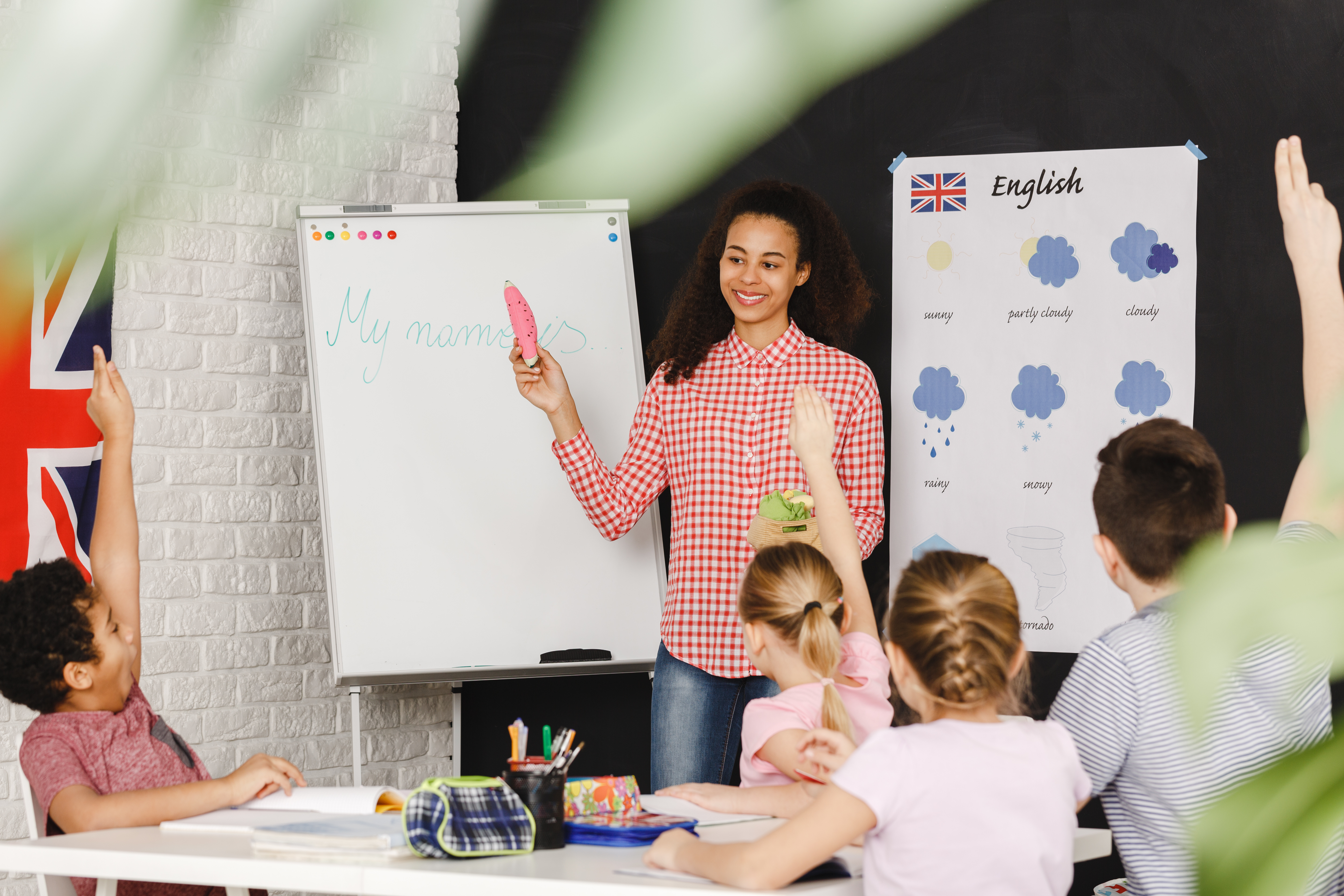PART A_1
Let’s introduce ourselves to each other.
PART A_2
My name is ________________. What is your name?
PART A_3
I am ________________. Nice to meet you.
PART A_4
Nice to meet you too, ________________. What time did you go to school today?
PART A_5
PART A_6
I see. Now, let’s begin our lesson!
PART B_1
Let’s study some words using the picture below. Please repeat after me.
PART B_2

| 1. | books |
| 2. | bookshelves |
| 3. | table |
| 4. | backpack |
| 5. | chairs |
PART B_3
Now, let’s review your answers.
(Please review your student’s answers by sending the correct answers.)
PART B_4
PART C_1
I will ask the following questions. Please answer based on the picture below. I will check if your sentences are complete and if the grammar is correct.
PART C_2

| 1. | What school subject do they study? |
| Answer: | They study ( English / math / science ). |
| 2. | How many students are there? |
| Answer: | There are ( three / six / four ). |
PART C_3
Now, let’s review your answers.
(Please review your student’s answers by sending the correct answers in complete sentences. After that, ask your student to read aloud his or her corrected answers.)
PART C_4
PART D_1
We will read aloud the dialogue below twice. I will check your pronunciation and intonation.
First, let’s read aloud clearly and slowly to check your pronunciation. Second, let’s try to read aloud at a natural speed.
First, let’s read aloud clearly and slowly to check your pronunciation. Second, let’s try to read aloud at a natural speed.
PART D_2
|
Andy:
|
Hello, James. What are you doing? |
|
James:
|
Hi, Andy. I am studying for the examinations in science and English tomorrow. |
|
Andy:
|
I see. Do you usually study here in the park? |
|
James:
|
Yes, I do. But sometimes, I study at home. |
|
Andy:
|
I see. I will study at the library tomorrow morning before the examination. Don’t you want to try studying with me at the library? |
|
James:
|
Sure, I’d love to. See you at the library tomorrow. |
At the library
|
Andy:
|
Hi, James. I’m glad you came. |
|
James:
|
Hi, Andy. Good thing there are only a few students at this time. Anyway, what is your favorite school subject? |
|
Andy:
|
My favorite school subject is science. How about you? |
|
James:
|
My favorite school subject is English. That is why I always bring my English dictionary so I can read it when I have free time. |
|
Andy:
|
That’s a great way to study English. Now, we need to find some English and science books to study for the examinations later. What time does our class start? |
|
James:
|
Our class starts at 1:00 p.m. Let’s study hard to have high scores in the examinations. |
PART D_3
Now, we’ll fill in the blanks and read aloud the dialogue. I will be Andy, and you will be James. After reading it once, we’ll switch roles. I will check your pronunciation and intonation.
(Please send the mispronounced words and expressions to your student.)
PART D_4
|
Andy:
|
Hello, James. What ____________ doing? |
|
James:
|
Hi, Andy. __________________ for the examinations in science and English tomorrow. |
|
Andy:
|
I see. Do ______ usually __________ here in the park? |
|
James:
|
Yes, ___________. But sometimes, I ________ at home. |
|
Andy:
|
I see. I will _____________ at the library tomorrow morning before the examination. _____________ want to try studying with me at the ____________? |
|
James:
|
Sure, I’d love to. See _______ at the ____________ tomorrow. |
At the library
|
Andy:
|
Hi, James. I’m glad ___________. |
|
James:
|
Hi, Andy. Good thing there are only __________________ at this time. Anyway, __________________ favorite school subject? |
|
Andy:
|
My favorite _____________ is science. How about you? |
|
James:
|
__________________ school subject is English. That is why I _______________________ dictionary so I can ___________ it when I have free time. |
|
Andy:
|
That’s a great way to __________________. Now, we need to find some English and science __________________________________ later. _________________________ our class start? |
|
James:
|
Our _____________________ at 1:00 p.m. Let’s study hard to have high scores in ___________________. |
PART D_5
Now, let’s review some words and sentences from part D_4.
(Please review the mispronounced words and expressions from part D_4.)
PART D_6
PART E_1
Now, please answer the following questions about yourself.
PART E_2
| Tutor: | What is your favorite school subject? |
| Student: | My favorite school subject is (science / English / math / history). |
| Tutor: | What time does your first class start? |
| Student: | My first class starts at (8:00 a.m. / 7:00 a.m. / 7:30 a.m.). |
PART E_3
Now, let’s review your answers.
(Please review your student’s answers by sending the correct answers in complete sentences. After that, ask your student to read aloud his or her corrected answers.)
PART E_4
PART F_1
Now, you will ask me questions. Please ask the questions below.
PART F_2
| Student: | How many (books / pens / computers) do you have? |
| Tutor: | I have _______ pens. |
| Student: | What do you use when studying (math / science / English)? |
| Tutor: | I use ______________ when studying English. |
PART F_3
Now, let’s review your answers.
(Please review your student’s answers by sending the correct answers in complete sentences. After that, ask your student to read aloud his or her corrected answers.)
PART F_4
PART G_1
Now, please answer the following questions.
I will check if your sentences are complete and if the grammar is correct.
I will check if your sentences are complete and if the grammar is correct.
PART G_2
|
1. |
What school subject do you like the least? |
|
Answer:
|
I like (English / math / science / history) the least. |
|
2. |
Is English the most difficult school subject for you? |
|
Answer:
|
(Yes / No), English is (not the most difficult / the most difficult) school subject for me. |
|
3. |
Do you have more than three school subjects in a day? |
|
Answer:
|
(Yes / No), I (do / don’t) have more than three school subjects in a day. |
|
4. |
What is the most important thing that you use when studying? |
|
Answer:
|
The most important thing I use when studying is (computer / pen / key). |
|
5. |
How many notebooks do you have? |
|
Answer:
|
I have (one / two / more than three) notebooks. |
|
6. |
Do you study English at home? |
|
Answer:
|
(Yes / No), I (study / don’t study) English at home. |
|
7. |
Do you like studying in the library? |
|
Answer:
|
(Yes / No), I (like / don’t like) studying in the library. |
PART G_3
Now, let’s review your answers.
(Please review your student’s answers by sending the correct answers in complete sentences. After that, ask your student to read aloud his or her corrected answers.)
PART G_4
PART H_1
Let’s do a free talk.
(Please do a free talk if you have time left.)
PART H_2
Tell me about your favorite school subject.
PART H_3

